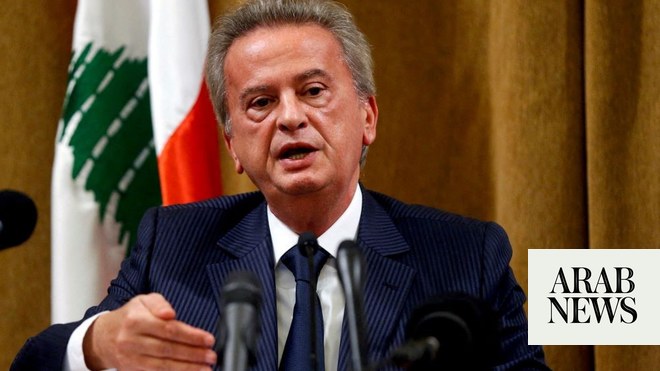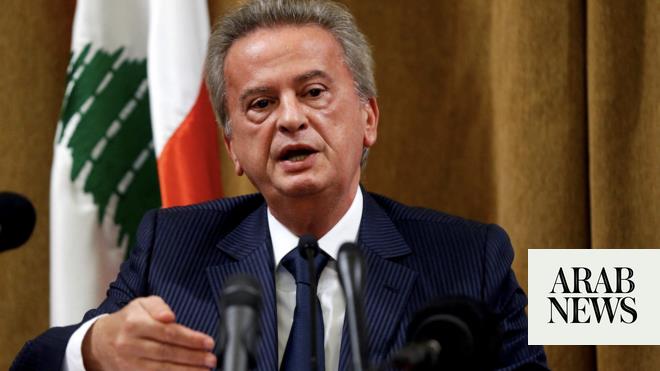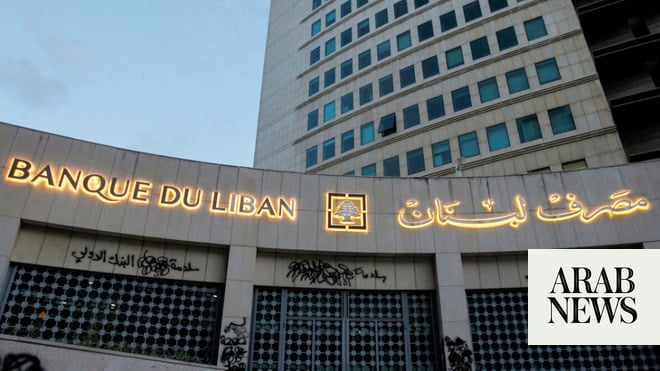
July 31 expiration of Salameh’s term will bring to an end a 30-year tenure stained by recent charges at home and abroad of embezzlement of Lebanese public funds
Legal representatives of Lebanese journalist Dima Sadek are preparing to file an appeal against the verdict issued on Tuesday sentencing her to one year in prison
BEIRUT: Charbel Abu Samra, the first investigative judge in Beirut, on Wednesday left the central bank"s governor, Riad Salameh, under investigation to complete the probe he is facing along with his brother Raja Salameh and his assistant Marianne Hoayek.
The July 31 expiration of Salameh’s term will bring to an end a 30-year tenure stained by recent charges at home and abroad of embezzlement of Lebanese public funds. Salameh denies the charges. Caretaker Premier Najib Mikati has said that he will not extend Salameh’s term.
A French and German judicial delegation, including the Munich prosecutor, held meetings at the Palace of Justice in Beirut, requesting the Lebanese state to raid the central bank, with the participation of the delegation, to search for documents related to Salameh and Hoayek as part of European investigations into financial corruption.
Riad and Raja Salameh, along with Hoayek, went to the Palace of Justice in Beirut with their defense lawyers and appeared before Judge Abu Samra to be interrogated as part of internal Lebanese investigations.
They have been accused of crimes including “embezzlement of public funds, money laundering, forgery, use of forged documents, illicit enrichment, violation of the employment law, and tax evasion.”
Raja Salameh and Hoayek left shortly after their interrogation session, while Riad Salameh’s interrogation continued for three hours in the presence of his lawyer, Hafez Zakhour, and the head of the litigation department at the Ministry of Justice, Helana Iskandar.
A judicial source told Arab News that Riad Salameh answered all questions and pledged to bring documents in the next session to prove what he had stated on Wednesday. The source said that Salameh might be required for a third interrogation session.
Salameh is considered a suspect in the Lebanese investigations until a decision is made to formally charge him. He is facing European judicial investigations for corruption, forgery, and forming a criminal gang to launder money and embezzle funds.
Earlier this month, a hearing was held by the French judiciary with Salameh’s former assistant, Hoayek, appearing in court in Paris on charges of forming a criminal gang and money laundering as part of an organized gang. However, Hoayek denied the charges and said that her wealth was a gift from her father.
The French judiciary suspects that Hoayek played a prominent role in an alleged criminal scheme to assist Salameh in accumulating real estate and financial assets and using Lebanese public funds illegally through a complex financial scheme.
The French judiciary ordered the judicial supervision of Hoayek and banned her from communicating with or working at the central bank of Lebanon, and obliged her to pay a financial guarantee of €1.5 million ($1.69 million).
Riad and Raja Salameh both failed to attend the hearing sessions scheduled for them in Paris.
Separately, legal representatives of Lebanese journalist Dima Sadek are preparing to file an appeal against the verdict issued on Tuesday sentencing her to one year in prison in a lawsuit filed by the Free Patriotic Movement on charges of defamation, stripping her of civil rights and imposing a fine of 110 million Lebanese pounds ($7,326).
Protests against the judicial verdict continued on Wednesday, as it is the first of its kind to be issued by a criminal judge in Beirut against a journalist or media figure. The journalistic body is usually tried in similar cases before the Press Court, which does not issue prison sentences.
Members of the parliamentary committee on media and telecommunications, which met on Wednesday under the chairmanship of Hezbollah MP Ibrahim Al-Mousawi, disagreed on issuing a recommendation to support media freedoms. Al-Mousawi said that there was a need for responsibility in exercising freedom.
MP Paula Yacoubian withdrew from the session, considering that “what Sadek has been subjected to is an unfair verdict, and we demand an independent judiciary law. We have asked the committee on media and telecommunications to condemn what happened and denounce the attack on media freedom.”
MP Saad Al-Asmar, of the Lebanese Forces Party, said: “Today’s division in the parliamentary committee on media is shameful, as we could not come up with a consensus to condemn the unjust judicial decisions against the media and journalists, especially the verdict to imprison Sadek, which we consider a blatant attack on freedom of expression and opinion guaranteed by the constitution.”
FPM praised the verdict issued against Sadek, accusing her of “fabricating lies and falsely accusing the FPM youth of being racists and accusing the movement of being a Nazi party.”
Sadek described FPM as a Nazi party in a tweet in 2020.












